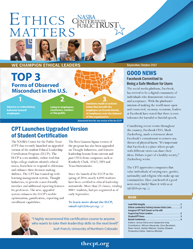Lead with Integrity: Ethical Leadership: An Idea or a Commitment? (Sept/Oct) 2017
Ethics Matters
September – October 2017
 Speaking with a group of future business leaders and entrepreneurs not long ago, we discussed commitment to ethical leadership versus the idea of ethical leadership. Our discussion contrasted leaders who behave and lead in a way that shows a commitment to making the most ethical decisions they can, regardless of the circumstances, to those who like the idea of ethical decision-making, unless circumstances force them (in their minds) to do something that may benefit them, while hurting or deceiving others. This interesting discussion started during a recent conference, where I participated as an attendee and speaker. I was on the program to talk about business ethics and was scheduled to speak after the business partner of a very successful, celebrity entrepreneur.In the business partner’s address, he told the story of how he and the celebrity entrepreneur took a risk that catapulted them from a struggling startup to a major player in their industry, but it violated an industry rule. While acknowledging that what they did was wrong, he told the audience the circumstances caused them to make the decision they made. After that story, he spent several minutes talking about positive values he appreciates in companies. However, during his Q&A session, he admitted that he and the celebrity entrepreneur would probably make the same decision again because of how it impacted their business. As I approached the podium, I contemplated how I could talk about ethical leadership in this new context without completely changing my prepared comments. What came to me was a new title and message: Many leaders like the idea of ethical leadership, but the best leaders are committed to it. What is the difference? How a leader responds under pressure. At the conclusion of my remarks, the audience was in agreement with me on the following points. First, we all have an opportunity to decide if we want ethical decision-making to be our priority over the bottom line. Secondly, numerous examples show that companies with an ethical culture lead their industries and have outperformed the stock market (Fred Kiel makes this point in his book Return on Character: The Real Reason Leaders and Their Companies Win). Finally, commitment is a daily decision that does not change with circumstances, but an idea can change with any opportunity. My hope is that you like the idea of ethical leadership enough to commit to it. Be committed with me, my friends. And as always, Lead with Integrity.
Speaking with a group of future business leaders and entrepreneurs not long ago, we discussed commitment to ethical leadership versus the idea of ethical leadership. Our discussion contrasted leaders who behave and lead in a way that shows a commitment to making the most ethical decisions they can, regardless of the circumstances, to those who like the idea of ethical decision-making, unless circumstances force them (in their minds) to do something that may benefit them, while hurting or deceiving others. This interesting discussion started during a recent conference, where I participated as an attendee and speaker. I was on the program to talk about business ethics and was scheduled to speak after the business partner of a very successful, celebrity entrepreneur.In the business partner’s address, he told the story of how he and the celebrity entrepreneur took a risk that catapulted them from a struggling startup to a major player in their industry, but it violated an industry rule. While acknowledging that what they did was wrong, he told the audience the circumstances caused them to make the decision they made. After that story, he spent several minutes talking about positive values he appreciates in companies. However, during his Q&A session, he admitted that he and the celebrity entrepreneur would probably make the same decision again because of how it impacted their business. As I approached the podium, I contemplated how I could talk about ethical leadership in this new context without completely changing my prepared comments. What came to me was a new title and message: Many leaders like the idea of ethical leadership, but the best leaders are committed to it. What is the difference? How a leader responds under pressure. At the conclusion of my remarks, the audience was in agreement with me on the following points. First, we all have an opportunity to decide if we want ethical decision-making to be our priority over the bottom line. Secondly, numerous examples show that companies with an ethical culture lead their industries and have outperformed the stock market (Fred Kiel makes this point in his book Return on Character: The Real Reason Leaders and Their Companies Win). Finally, commitment is a daily decision that does not change with circumstances, but an idea can change with any opportunity. My hope is that you like the idea of ethical leadership enough to commit to it. Be committed with me, my friends. And as always, Lead with Integrity.
